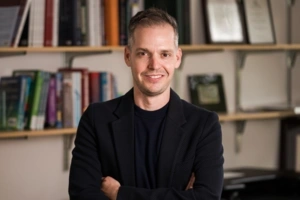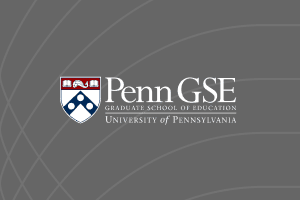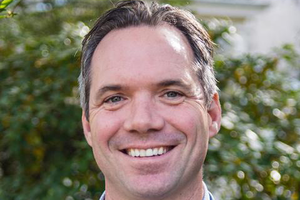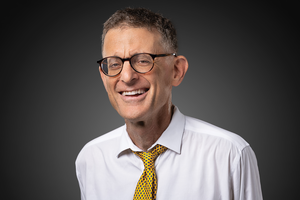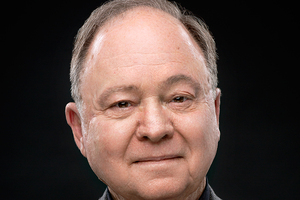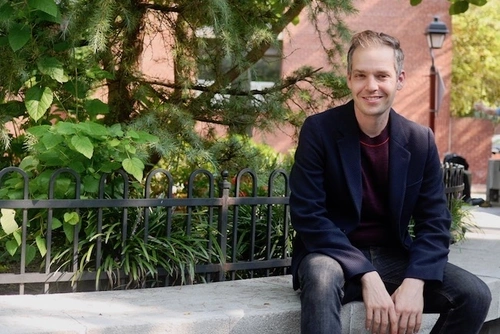
When Michael Gottfried moved from California to Philadelphia this summer, it was a homecoming of sorts. An applied economist, Gottfried was first inspired by the powers of data-driven education policy to improve children’s lives when he was a graduate student at Penn in the early 2000s.
Fast forward more than a decade, and Penn GSE welcomes Gottfried back to campus as an associate professor in the top-ranked Education Policy Division. We recently met up with him to find out more about his research and what drew him back to Philly.
Q: You received your PhD in applied economics from Wharton in 2010. What drew you to education as your area of expertise?
I did! I was just across Locust Walk in "Steiny-D" in the Applied Economics program. It was during my coursework at Wharton (in my 2nd year) that I realized that I could use the applied empirical methods that I had learned to address issues in education policy and ultimately to help improve the lives of schoolchildren -- all through the lens of the analysis of data. So I was inspired by the idea of intertwining the analytical tools acquired in applied economics with theories of action in education and policy.
Q: Was it always your goal to work in education, or did some experience lead to your interest in this field?
I can definitely pinpoint an experience that led me to my interest in education -- it was Rebecca Maynard's Institute of Education Sciences Predoctoral Program. This program, housed in GSE, supported an interdisciplinary group of PhD students across Penn to come together and think about education policy together. It was through this program that I gained so many research opportunities and made so many friends! Once I started this program, I almost immediately realized -- being in a school of education is the place for me.
Q: You recently Tweeted about working with Kamala Harris on reducing truancy in California. Can you tell us more about this?
Sure thing! About 5 years ago -- when Kamala Harris was the Attorney General in California -- someone from her office reached out to me to talk about the possibility of working together on absenteeism-reduction projects. Harris and her team were interested in thinking about how excessive absenteeism in the education system might be linked to the juvenile justice system and, ultimately, the adult justice system. It was exciting for me to have a research partner who was interested in our schools, but from outside of the school system.
Our partnership flourished, and many of the projects were funded by the Stuart Foundation. The idea of these projects was for me and my research team of PhD students to identify (a) exactly how much absenteeism hurt our students, and (b) whether there are any scalable and replicable practices. This work led to many research publications, including journal articles and a book, as well as many presentations both to research and policy audiences. Perhaps most exciting, back in April 2019 when the book came out, I hand delivered a copy of the book to Harris’s DC Senate office.
Q: What education issues and questions would benefit from a new, data-driven look?
I'm excited about thinking about opportunities to explore how other sectors of the community might be affecting children at school. So I think that questions pertaining to health services and its intersection with schooling would be particularly interesting. I think this will be especially important as our world progresses with COVID-19. How can schools best address health issues in the future? Can health services be provided at schools? How do these services affect students' performance at school, like attendance and achievement? And how does inequality grow or shrink based on answers to these questions?
Q: You work in a number of different areas in education, among them truancy, special education, and career and technical education. What links these areas together for you?
This is a great question. I think about these through the lens of economics of education. In the economics of education, there is the education production function -- where economists think about what 'inputs' matter for children's outcomes. These inputs might be being present at school, receiving special education services, taking career-related courses. So while they may appear to be separate, they are all linked in that each has importance in helping to support children progress through schooling.
Q: You started an organization called the Education Policy Collaborative. Can you tell us more about this group?
I'm so excited to talk about the Education Policy Collaborative -- or "EPC" for short. I founded EPC as a way to bring together education policy faculty from across the country. The purpose of EPC is to provide numerous opportunities to convene in order to (1) build a strong network together and get to know each other's research; (2) provide in-depth feedback on work that is in progress; (3) develop new research teams and together think about ways that our research can impact policy; (4) mentor pre-tenure junior faculty; and (5) leave time for fun outside of the conference room or classroom.
Because we are smaller than typical research meetings, it has also been great being able to have conferences in smaller locations that bigger conferences can't go to, such as Boulder (CO), Raleigh (NC), and Austin (TX).
Q: How has the pandemic affected your research?
Because my work involves using secondary datasets, such as those from a school district, the pandemic hasn't affected my ability to do my analyses per se. I can easily analyze the data on my computer or online. But, the pandemic has cut all in-person meetings with my research teams. And while we are able to meet in Zoom, there is of course something missing in the in-person interactions.
I also miss having the opportunity to travel and present in person at conferences or at other university seminars. It is so fun to see my colleagues and friends in person and to be able to catch up and talk about research projects over a meal and in a new city.
Q: What drew you back to Penn?
There were four things that drew me back to Penn.
First were the faculty and students. The quality of people at Penn is truly unparalleled, and I was excited about the opportunity to have such amazing faculty and students as colleagues, co-authors, and friends.
Second, there are so many exciting top-tier schools within Penn. Beyond the amazing work going on at the prestigious GSE, I was excited to have Wharton and Nursing at my fingertips to think about research opportunities.
Third, was Penn's location. It meant a lot to me to return to a university that is weaved into the city. It's very exciting that the same Walnut Street near Penn is the same one near Rittenhouse and near Old City. But this is also important because I felt that at Penn, I could make an impact directly on the city and the school system in which I was also a faculty member, because the city is right there! Penn doesn't feel 'insulated' the way that many other universities do.
Finally was Penn's location again -- but in a different way. Given that Penn is in Philadelphia, it puts the university right in the center of the Northeast Corridor -- near NYC and near DC. For both personal and professional reasons, it's exciting to have both at my fingertips.
Q: What’s your favorite Philly food? Your favorite Philly experience?
Hands-down the Tehina Shake and Falafel at Goldie.
My best experience is picnicking in Rittenhouse Square for dinner with my husband and friends. The square is so iconic Philadelphia, and the dog watching is unbeatable! If you see me in the park, come join us!
